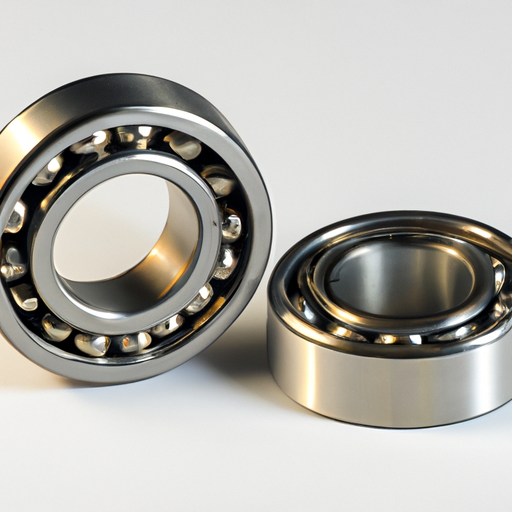In this article, we will explore the key differences between original Koyo bearings and counterfeit ones. When it comes to purchasing bearings, it is essential to be aware of the potential risks of buying fake products. By understanding the distinctions and knowing what to look for, you can ensure you are investing in authentic Koyo bearings that deliver the high-quality performance and reliability that you expect. Let’s uncover the truth behind Koyo bearing originality and unveil the telltale signs that distinguish the real deal from the counterfeit options.

What are Koyo bearings?
Koyo bearings are high-quality bearings produced by the Japanese company, Koyo Seiko Co., Ltd. These bearings are known for their superior performance, reliability, and durability. They are widely used in various industries, including automotive, aerospace, industrial machinery, electronics, and energy.
Definition
Koyo bearings are precision-engineered components that facilitate the smooth movement of rotating parts in machines and equipment. They are designed to withstand heavy loads, high speeds, and demanding operating conditions.
Types of Koyo bearings
Koyo offers a wide range of bearings to cater to different applications and industries. Some of the common types of Koyo bearings include deep groove ball bearings, angular contact ball bearings, tapered roller bearings, spherical roller bearings, cylindrical roller bearings, and needle roller bearings. Each of these types has its own unique design and features to suit specific needs.
Signs to identify fake Koyo bearings
As with any reputable brand, counterfeit products can quickly flood the market. To ensure you are purchasing genuine Koyo bearings, it is essential to be aware of the signs that can help you identify fake ones.
Price
One of the first signs of counterfeit Koyo bearings is unusually low prices. Fake bearings are often sold at significantly discounted prices compared to genuine ones. It is important to remember that Koyo bearings are precision-engineered components, and their quality justifies a certain price range. If a deal seems too good to be true, it is likely that the bearings are counterfeit.
Packaging
Genuine Koyo bearings are packaged in high-quality, branded packaging. The packaging typically includes clear labeling, product information, and the Koyo logo. Counterfeit bearings may have packaging that is poorly printed, lacks essential details, or does not have the Koyo logo. Carefully examine the packaging for any signs of tampering or poor quality.
Logo and branding
Authentic Koyo bearings feature the Koyo logo and branding, which are consistent across all their products. The logo is clearly displayed on the bearing itself, as well as on the packaging. Counterfeit bearings may have modified or distorted logos, or they may completely lack the Koyo branding. Pay attention to the accuracy and consistency of the logo.
Quality of materials
Counterfeit Koyo bearings often compromise on the quality of materials used in their production. Genuine Koyo bearings are made from high-grade materials that meet strict quality standards. Fake bearings may exhibit signs of poor craftsmanship, low-quality materials, or even incorrect dimensions. Check for any irregularities or inconsistencies in the materials and construction of the bearings.
Weight
Authentic Koyo bearings undergo rigorous quality control processes, ensuring their weight is consistent and accurate. Counterfeit bearings may have variations in weight due to the use of substandard materials or improper manufacturing techniques. Compare the weight of the bearing you suspect to be fake with a genuine Koyo bearing of the same type and size.
Documentation
Genuine Koyo bearings are accompanied by proper documentation, including certificates of origin, batch codes, and other relevant information. Counterfeit bearings often lack proper documentation or have forged documents that do not match the genuine ones. Insist on obtaining all necessary documentation when purchasing Koyo bearings.
Differences between original and fake Koyo bearings
The differences between genuine and fake Koyo bearings can have significant implications for performance, durability, and safety.
Performance and durability
Authentic Koyo bearings are engineered to meet strict performance and durability requirements. They are tested and manufactured to withstand heavy loads, high speeds, and prolonged usage. Fake bearings may lack the necessary design features and quality control, leading to reduced performance and lower durability. Genuine Koyo bearings will provide superior performance and last longer.
Tolerance levels
Tolerance levels refer to the permissible deviation from the specified dimensions of a bearing. Genuine Koyo bearings are manufactured to precise tolerance levels, ensuring accurate fitment and smooth operation. Counterfeit bearings may have inconsistent tolerance levels, resulting in improper fitment, increased friction, and potential failure.
Noise levels
Genuine Koyo bearings are designed to operate silently or with minimal noise. They undergo meticulous quality control processes to ensure low noise levels during operation. Fake bearings may produce excessive noise due to poor manufacturing techniques, inferior materials, or incorrect internal clearances. Excessive noise can indicate a counterfeit bearing.
Vibration
Authentic Koyo bearings have excellent vibration resistance, minimizing vibrations and oscillations during operation. Counterfeit bearings may lack proper balance or have inadequate internal clearances, leading to excessive vibration. Excessive vibration can result in premature wear, increased stress on surrounding components, and potential equipment failure.
Heat resistance
Koyo bearings are engineered to withstand high temperatures generated during operation. They are made from heat-treated materials and have proper lubrication to ensure optimal performance under elevated temperatures. Fake bearings may lack the necessary heat resistance, leading to premature failure, increased wear, and potential safety hazards.
Load capacity
Genuine Koyo bearings have precise load-carrying capacities, allowing them to withstand heavy loads without deformation or failure. Counterfeit bearings may have reduced load-carrying capacities due to inferior materials or inadequate manufacturing processes. Using fake bearings in applications that require high load capacities can result in catastrophic failures and safety risks.
Impact of using fake Koyo bearings
Using counterfeit Koyo bearings can have several negative impacts, affecting safety, performance, and maintenance costs.
Safety risks
Counterfeit bearings may not meet the necessary safety standards and specifications required for specific applications. They may fail prematurely, leading to equipment malfunction, accidents, and potential injuries to personnel. Genuine Koyo bearings are engineered to prioritize safety and meet stringent industry requirements.
Reduced performance
Fake Koyo bearings often lack the design features and quality control measures that are essential for optimal performance. They may introduce excessive friction, increase wear and tear, and compromise the overall efficiency of the machinery in which they are installed. Genuine Koyo bearings will ensure consistent and reliable performance.
Increased downtime
The use of counterfeit bearings can result in increased downtime due to unexpected failures, repairs, and replacement. This can have a significant impact on productivity and profitability, especially in industries where downtime can be costly. Genuine Koyo bearings are known for their reliability and durability, minimizing the risk of unexpected downtime.
Higher maintenance costs
Counterfeit bearings may require more frequent maintenance and replacement, resulting in higher maintenance costs over time. Genuine Koyo bearings are designed to be low-maintenance, reducing the overall cost and effort required for regular maintenance. Investing in genuine bearings can result in long-term cost savings.

How to verify the authenticity of Koyo bearings
To ensure you are purchasing genuine Koyo bearings, consider the following verification methods:
Buy from authorized dealers
The most reliable way to obtain genuine Koyo bearings is to purchase them from authorized dealers or distributors. Authorized dealers have direct access to genuine products and can provide the necessary documentation and support.
Check holographic stickers
Genuine Koyo bearings often come with holographic stickers on their packaging or products. These stickers have unique holographic patterns that are difficult to replicate. Check for the presence of these stickers and verify their authenticity using the manufacturer’s guidelines.
Serial numbers and barcodes
Genuine Koyo bearings are typically identified by unique serial numbers and barcodes. These identifiers can be cross-referenced with the manufacturer’s database to confirm their authenticity. Ensure that the serial numbers and barcodes on the bearings and their packaging match.
Contact Koyo for verification
If you have any doubts about the authenticity of a Koyo bearing, you can contact Koyo directly for verification. Provide them with the relevant details such as serial numbers, barcodes, and purchase information. Koyo’s customer support team will assist you in verifying the legitimacy of the product.
Consult expert technicians
Expert technicians or engineers in the field of bearings can provide valuable insights and assistance in verifying the authenticity of Koyo bearings. Their experience and knowledge can help identify any red flags and ensure you make informed purchasing decisions.
Consequences of purchasing fake Koyo bearings
The consequences of purchasing counterfeit Koyo bearings go beyond just the immediate impact on performance and safety.
Legal implications
The sale and use of counterfeit products, including bearings, can have legal implications. Intellectual property rights may be violated, leading to potential lawsuits and legal disputes. Businesses that knowingly distribute or use fake bearings can face severe legal consequences.
Financial losses
Investing in counterfeit bearings can result in financial losses due to premature failures, increased maintenance costs, and potential damage to other components or machinery. Genuine Koyo bearings may cost a bit more initially, but they provide long-term value and cost savings.
Reputation damage
Using counterfeit bearings can damage the reputation of businesses, manufacturers, or users. Customers may lose trust in the product or brand if they experience failures, safety issues, or performance problems. Maintaining a reputation for quality and reliability is crucial for business success.

Common industries affected by counterfeit Koyo bearings
Counterfeit Koyo bearings can impact various industries, where reliability and performance are critical.
Automotive
The automotive industry relies heavily on high-quality bearings to ensure smooth and efficient operation of engines, transmissions, suspensions, and other components. Counterfeit bearings can jeopardize vehicle safety, performance, and reliability.
Aerospace
In the aerospace industry, where strict safety standards are paramount, counterfeit bearings pose significant risks. Substandard bearings can compromise the integrity of aircraft systems, leading to catastrophic failures and endangering lives.
Industrial machinery
Industrial machinery, such as manufacturing equipment, relies on reliable bearings to maintain productivity and efficiency. Counterfeit bearings can cause unplanned downtime, disrupt production schedules, and increase maintenance costs.
Electronics
Electronics manufacturing often involves small and precise bearings in devices such as motors, fans, and hard drives. Counterfeit bearings can lead to malfunctioning electronics, affecting product performance, reliability, and customer satisfaction.
Energy
The energy industry, including renewable energy sectors such as wind turbines, relies on bearings for generating power. Counterfeit bearings can lead to equipment failures, costly repairs, and reduced energy output.
Steps taken by Koyo to combat counterfeits
Koyo takes counterfeiting seriously and actively works to combat the sale and distribution of fake bearings.
Awareness campaigns
Koyo conducts awareness campaigns to educate customers, distributors, and industry professionals about the risks and consequences of counterfeit bearings. These campaigns aim to raise awareness and promote the importance of purchasing genuine Koyo bearings.
Brand protection measures
Koyo employs various brand protection measures, such as holograms, unique markings, and packaging designs, to make their products easily distinguishable from counterfeits. These measures help customers verify the authenticity of Koyo bearings.
Collaboration with law enforcement
Koyo collaborates with law enforcement agencies to identify and apprehend individuals and organizations involved in the production and distribution of counterfeit bearings. By actively participating in legal actions, Koyo strives to protect its customers and maintain the integrity of its brand.

Tips for customers to avoid fake Koyo bearings
Customers can take specific precautions to minimize the risk of purchasing counterfeit Koyo bearings.
Purchase from reputable suppliers
Buy Koyo bearings only from reputable suppliers, authorized dealers, or well-known distributors. These suppliers have established relationships with manufacturers and can provide genuine products with proper documentation.
Perform visual inspections
Carefully examine the packaging, labels, and product markings for any signs of tampering, poor quality, or inconsistencies. Counterfeit bearings often have noticeable differences in appearance compared to genuine ones.
Compare with genuine product
If possible, compare the suspected bearing with an authentic Koyo bearing of the same type and size. Look for any differences in packaging, branding, and construction. Pay attention to details such as logo accuracy, weight, and overall quality.
Educate staff and employees
Educate your staff and employees about the risks and consequences of counterfeit bearings. Train them to identify the signs of counterfeit products and encourage them to report any suspected fakes to prevent their use.
Stay updated on latest counterfeiting techniques
Counterfeiters are continually improving their techniques, making it important to stay informed about the latest counterfeiting trends. Regularly update yourself on counterfeit Koyo bearings and the measures taken by the manufacturer to combat counterfeits.
Conclusion
Purchasing genuine Koyo bearings is crucial to ensure optimal performance, reliability, and safety in various industries. By being aware of the signs of counterfeit bearings and following the verification methods, customers can protect themselves from the risks and consequences associated with fake products. Koyo’s continuous efforts to combat counterfeiting and the collaboration between manufacturers, customers, and law enforcement are essential in preserving the integrity of the brand and maintaining the highest standards of quality.

